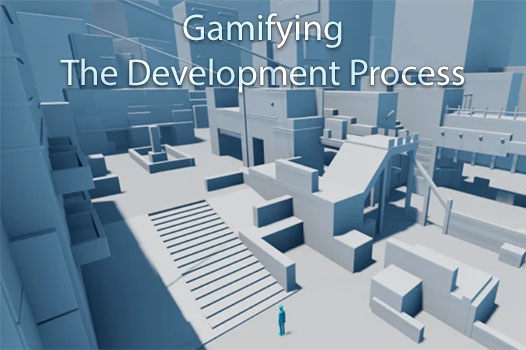The Future of Gamification
The Future of Gamification: Revolutionizing Industries with Game Engines
What is Gamification?
Gamification integrates game-like elements such as points, badges, leaderboards, and interactive storytelling into non-game contexts to boost engagement, motivation, and learning. This approach makes activities more enjoyable, increasing participation and retention, and is transforming industries like education, training, and urban planning.
Traditional game engines excel in graphics and real-time rendering but lack a real-time MMO framework, posing challenges for large-scale, collaborative online development. Custom development and slower updates can hinder efficiency and innovation.
Apex Engine builds on our foundational experience with HeroEngine, which excelled in real-time collaborative development despite its lower graphic quality and outdated infrastructure. Apex Engine enhances modern features and robust collaborative tools. By leveraging gamification, Apex Engine boosts engagement, improves learning outcomes, and offers valuable insights across various professional applications.
Using Game Engines for Gamified Development in Serious Applications
Game engines create interactive, immersive experiences ideal for gamified applications in serious fields like virtual training, aviation, healthcare, military, and emergency response, enabling safe practice. They also enhance learning by integrating game mechanics into training modules, making the process more engaging and effective.
Game engines enable virtual walkthroughs and real-time visualization in architecture, enhancing BIM with interactive, environments. In civil engineering, they provide infrastructure simulations for better understanding and problem-solving. For smart cities, game engines create interactive models for urban planners to simulate development scenarios and engage the public visually and interactively.
Digital twins, which are real-time digital representations of physical assets, leverage game engines for real-time monitoring and interactive visualization. This is useful for maintaining buildings, factories, and cities. Predictive analysis through digital twins helps in predicting the impact of changes and optimizing performance.
Advantages of Using Game Engines for Gamified Development
Game engines provide immersive high-quality graphics and physics simulations, creating realistic virtual environments. They offer interactivity and immediate feedback, enhancing learning and engagement. The flexibility allows adaptation for various non-gaming applications, handling large-scale simulations and complex data, making them ideal for smart cities and digital twins.
Leveraging Gamification with Game Engines
Traditional game engines, such as Unreal Engine developed by Epic Games, have extended their reach beyond gaming to leverage gamification for various professional and industrial applications. Game engines allow the creation of realistic simulations for training, education, and emergency response scenarios for emergency services, enhancing training and preparedness.
In architecture and real estate, traditional game engines enable virtual walkthroughs and immersive tours of buildings and properties, allowing clients to experience spaces before they are built. Real-time rendering and interactive models improve design visualization and client communication. For engineering and construction, these engines integrate with BIM systems to create interactive 3D models, aiding in design review, clash detection, and project management.
Engineers use game engines to visualize infrastructure projects, assessing design impacts. The automotive and manufacturing industries benefit from virtual prototyping, allowing quick design testing and iteration. For smart cities, game engines allowing the creation of detailed virtual city models, enabling planners to simulate and analyze development projects and policy changes. These interactive models engage the public, providing an interactive way to understand proposed changes.
Advantages of Traditional Modern Game Engines
Modern game engines are renowned for their high-quality graphics, delivering stunning visuals and realistic environments. Their versatility supports various applications, from gaming to professional simulations. Visual scripting systems, like Unreal Engine's Blueprints, enable developers to create complex interactions and gameplay simulation targeting their industry.
Disadvantages of Traditional Game Engines' Lack of a Real-Time MMO Framework
Traditional game engines also face challenges due to the lack of a built-in real-time MMO framework. Developing a traditional MMO framework is complex and resource-intensive, requiring significant expertise and time. Developers must invest additional time in developing integrating and maintaining the network and versioning systems, slowing down the process. Regular updates and maintenance become more cumbersome as developers must ensure their custom solutions remain compatible with engine updates.
Traditional game engines also lack built-in real-time collaborative tools for MMO development, hindering team collaboration and real-time feedback. Developers must rely on traditional methods for testing and feedback, which can delay the identification and resolution of issues.
A Legacy of Real-Time Collaboration
Our legacy technology, HeroEngine, developed by our core while at Simutronics, has proven invaluable across various industries due to its all-in-one platform and real-time collaboration capabilities. It enabled seamless collaboration among developers, engineers, artists, QA teams, and clients globally, offering immediate feedback and streamlining the development process. However, HeroEngine's lower graphic quality, outdated infrastructure, and older client-side toolsets presented challenges in visual fidelity and modern development efficiency.
Apex Engine: Bridging the Gap and Advancing the Future
Apex Engine, building on the strengths of our legacy HeroEngine, offers all the unique advantages of real-time collaboration and an integrated development environment while addressing the limitations of traditional game engines. Apex Engine is designed to support a wide range of industries, from architecture and real estate to smart cities and civil engineering, providing the tools necessary for creating advanced 3D interactive applications.
By maintaining the real-time, live collaborative environment, Apex Engine allows teams to work seamlessly from anywhere in the world. This enables enhanced accessibility for employees regardless of their physical location or limitations. It reduces downtime and associated costs, making development more efficient and cost-effective. Apex Engine's advanced capabilities ensure high-quality graphics and modern features, filling the gaps left by traditional engines and offering scalability for large-scale simulations and complex data handling.
For emerging markets, Apex Engine's gamified approach transforms how businesses train, plan, and engage with their environments. Whether through virtual training simulations, interactive architectural designs, or detailed urban planning models, Apex Engine saves time and costs by providing a comprehensive, user-friendly platform that meets the demands of modern development. This makes it an ideal solution for industries looking to innovate and lead in the creation of 3D interactive applications.